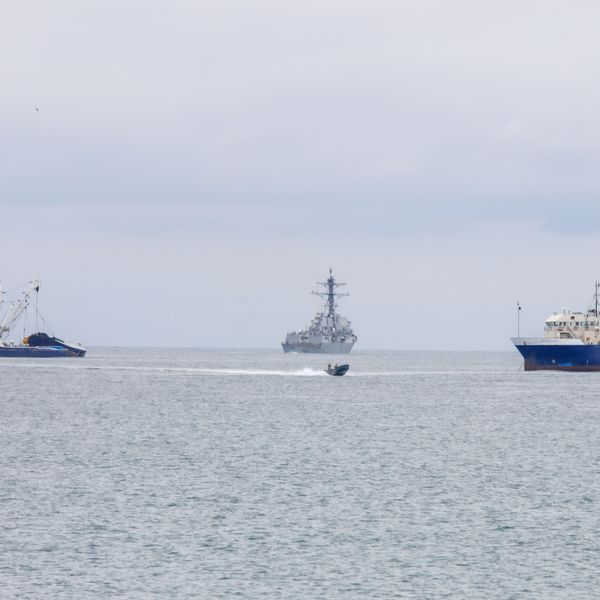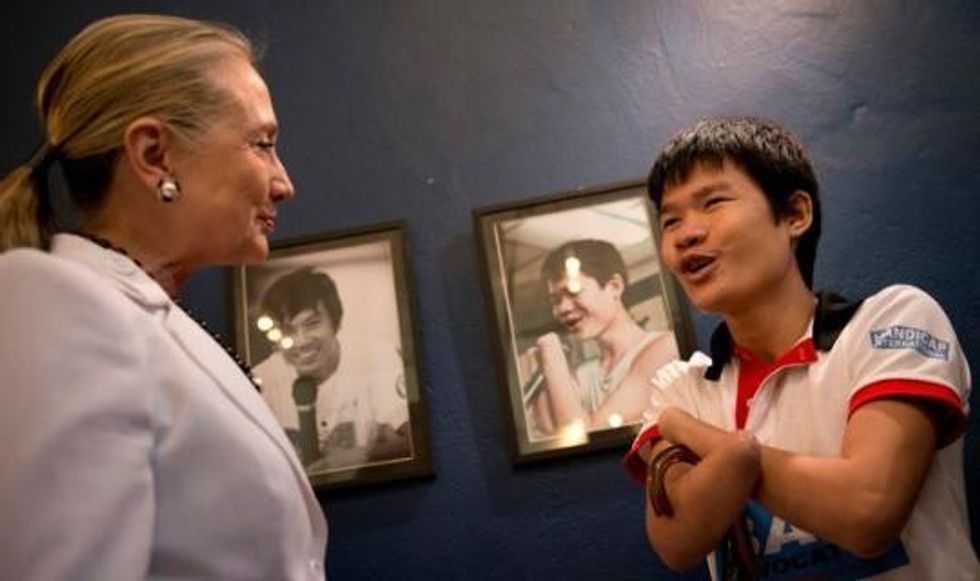Secretary of State Hillary Clinton was confronted by a dramatic legacy of U.S. warmaking during her recent visit to Laos.
"At an artificial-limb center, Mrs. Clinton met a nineteen-year-old who lost his forearms and eyesight when a bomb, dropped by the United States Air Force during the Vietnam War and unexploded for decades, finally blew up three years ago," the New York Times reported.
Phongsavath Sonilya was yet another casualty of a war that the United States waged in secret as part of its intervention in Indochina--a war clouded in obscurity but almost unimaginable in its ferocity.
"Between 1964 and 1973, the United States dropped the equivalent of one planeload of bombs every eight minutes, twenty-four hours a day, on a country the size of Minnesota," Douglas Hartwick writes for Foreign Policy in Focus. "One ton of bombs was dropped for every man, woman, and child in Laos at the time, making it the most heavily bombed country per capita in history."
More than 100 countries have signed the Convention on Cluster Bomsb, and more than fifty have ratified it, but the United States stubbornly refuses to join in.
And the impact of the U.S. bombing did not stop with the war.
"Four decades later, American weapons are still claiming lives," the Associated Press reports. "When the war ended, about a third of some 270 million cluster bombs dropped on Laos had failed to detonate. More than 20,000 people have been killed in Laos since then by ordnance, according to its government, and agricultural development has been stymied."
How does the United States even begin to atone for this?
The victim of U.S. aggression that Clinton met had a clear suggestion for her.
"The young man, Phongsavath Sonilya, gesticulated with his arm stumps as he explained to Mrs. Clinton that more than three decades after the end of the war, not enough had been done to stop the use of cluster bombs and to support those who may be injured in the future by bombs still lying unexploded in the countryside," the New York Times reports. "The United States has not signed the Convention on Cluster Bombs."
What exactly are cluster bombs and what is the convention dealing with them?
"Cluster munitions are large weapons which are deployed from the air and from the ground and release dozens or hundreds of smaller submunitions," explains the Cluster Munition Coalition, a global network of hundreds of organizations. "The Convention on Cluster Munitions prohibits all use, stockpiling, production and transfer of cluster munitions."
More than 100 countries have signed the treaty, and more than fifty have ratified it, but the United States stubbornly refuses to join in. The U.S. stance betrays a callousness toward the people whose lives are so severely affected by cluster bombs.
"Farmers tilling their land are often maimed or killed when striking 'bombies' that settle below ground," Tom Fawthrop writes for Foreign Policy in Focus. "Children are frequent victims because they are attracted to the bombies' bright colors and odd shapes."
Clinton called the artificial limb center she visited "a painful reminder of the Vietnam War era" and added that "the international community will join us in our efforts to bring this legacy of the Vietnam War to a safe end," as a prelude to announcing a tepid increase in the appallingly modest U.S. handout ($5 million in 2010) to clean up its mess.
But she has not taken the obvious and urgent moral step: pushing President Obama to sign the cluster bomb treaty.



